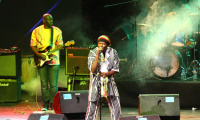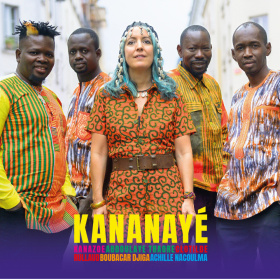Tech makes biggest case at Midem Africa 2021
The Midem Africa digital event last week concluded its four-day marathon of activities, which included presentations, keynotes, panel discussions, showcases, networking and business accelerator sessions. Tech and the digital music ecosystem in Africa were high on the agenda throughout the B2B event, which unveiled various opportunities and tools that can help propel the careers of artists and music professionals in Africa.
 Stephanie Adamu.
Stephanie Adamu.
For the inaugural edition, Midem named Kenya as ‘country of honour‘ and featured several big industry names from Africa and around the globe to share insights and possible solutions for the challenges that the African music industry is currently facing. The focus on digital was compelling evidence of the growing need to form an efficient digital ecosystem in the region, which has been penetrated by a host of foreign digital service providers (DSPs) in the past few years.
Tech fuels music consumption
During a panel titled Why Is Africa a Good Market to Enter for Music Tech Startups? Google Nigeria director Juliet Ehimuan suggested that growth in digital is a consequence of a rise in tech usage based on increased smartphone penetration and more affordable data prices. The evolution in tech is also attracting aggressive investment within the fintech sector, which is producing a knock-on effect for the music tech industry, the exec said.
UK music analytics company MRC Data vice-president of global Helena Kosinski gave more context about the increasing interest in digital during her presentation, Africa’s Role in a Global Music Marketplace. She cited an International Federation of the Phonographic Industry (IFPI) report that says the continent’s recorded music revenues grew 37.8% last year. However, cumulative streams by the top African artists amounted to only 0.3%, which indicated strong potential for growth. Increased collaboration between artists across borders coupled with a growing appetite for music discovery by fans on social media are pushing the demand for African music, Kosinski said.
More creative strategies required
A discussion titled Power of Digital: How Social Media & Streaming Put African Music on the Map explored the impact of evolving tech by highlighting the role that social media and music streaming plays in pushing African music into international markets.
Music marketing and PR exec Stephanie Adamu said the ability of social media to reach audiences that could previously not be accessed through traditional channels had made social networks the biggest and most important marketing tool to amplify music. However, the success of promotional campaigns depended on adopting creative strategies, she said. She gave instances of this, like providing exclusive content such as video premieres before an official launch or using platforms like Clubhouse for listening sessions to direct audiences to streaming platforms and thereby convert them into fans. In terms of streaming, an emphasis on the use of data analytics could add more value to strategy, as opposed to pitching for various playlists without a concrete objective in mind.
Music discovery tech
Midem Africa also dedicated a session to Canadian digital media and entertainment company Hitlab, which is behind a tool that uses algorithms to predict the potential of a song to become a commercial hit, as well as to determine whether a singer’s voice has the desirable qualities to become a popstar based on a set of 83 parameters.
The tool is expected to revolutionise how cultural content is discovered, produced and consumed. Hitlab has introduced a number of programmes, including launching a channel and radio station for emerging artists, an academy for music business education, and the Digital Emerging Artists Showcase, which provides artists around the word the opportunity to compete and showcase their talent to a broader audience.
Navigating the digital space
A number of companies joined in to offer pointers and introduce tools that could help artists navigate the digital distribution and publishing space, with Spotify, which expanded its services to more African countries earlier this year, sponsoring a masterclass on the tools it offers artists, managers, songwriters and labels.
Independent publisher Songtrust’s Mandy Aubry and digital distributor FUGA’s Dorothee Imhoff tackled issues around key royalty streams. The two also identified new trends and opportunities in the digital age. The Orchard, meanwhile, zeroed in on distribution in Africa during its Global Marketplace session. Additionally, the Society of Authors, Composers and Publishers of Music (SACEM) sponsored a segment that unpacked the intricacies of collective management and handling digital rights in Africa.
The final panel focused on TV, film and advertising opportunities. The discussion saw Sheer Publishing Africa’s David Alexander, who also moderated the discussion, and CD Baby’s Sakhele Mzalazala, among others, offering advice to musicians on how to exploit sync and publishing opportunities.
Despite providing great potential and opportunities, the digital ecosystem is not without its challenges. This was apparent during Warner Music Group’s (WMG’s) keynote The Music Industry in Africa Today & Tomorrow, which saw WMG’s managing director for South Africa and senior vice-president of strategy in sub-Saharan Africa, Temi Adeniji, emerging markets president Alfonso Perez-Soto, and North Africa and Middle East managing director in Moe Hamzeh give plenty of food for thought on how to navigate the industry in the future. The execs emphasised that the African music market should not be treated as one due to its immense multicultural makeup.






























Commentaires
s'identifier or register to post comments